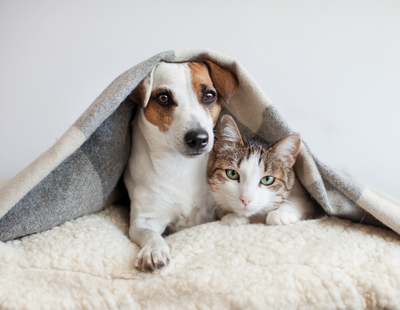This includes people being forced to move or downsize as rental prices increase but are unable to find suitable and affordable pet-friendly properties.
Meanwhile,Cats Protection says that last year it took in around 1,300 cats – the equivalent of at least three cats each day – due to landlords not allowing them in their properties, making it the eighth most-cited reason as to why cats are given up to the charity.
The charities says that currently there are no legal rights for renters with pets, and landlords can refuse to rent to tenants with pets.
The government updated its Model Tenancy Agreement in 2021 to remove blanket bans on pets from the standard contract. Under this agreement, any restrictions on pet ownership must be ‘reasonable’; however, there is no legal requirement for landlords to use this tenancy template.
The government has outlined plans to introduce better protection for tenants as part of its Renters Reform Bill, due to be put forward to Parliament at some point this year. Draft policies detailed in a White Paper published last year included giving tenants the right to request a pet in the property which the landlord must consider and cannot unreasonably refuse.
According to research conducted in 2021 by Dogs Trust and Cats Protection, landlords are split on whether they allow pets.
Some 46 per cent say they allow pets. However, the number of tenants saying their tenancy allows pets is much lower than this with just 30 per cent saying their landlord would allow a dog in the property and 32 per cent saying cats are permitted.
The same research revealed that, in over a third of cases where cats or dogs have not been allowed by a private landlord, the landlord did not proactively decide this based on the individual tenants or pets, but either followed advice or used a standard template.
The charities, in a statement, say pets have a positive impact on the quality of life and mental health of their owners. Some 98 per cent of tenants say their dog has some form of positive impact on their life, and 94 per cent say the same about their cats.
The statement adds: “Allowing pets in rental properties could be advantageous to landlords. Allowing pets could increase the amount of time tenants choose to rent a property. Research by Dogs Trust and Cats Protection found that 26 per cent of tenants would stay longer in a property if they were allowed to keep a pet.”
Paula Boyden, veterinary director of Dogs Trust, says: “2022 was the busiest year in our history for relinquishment enquiries. Sadly, one of the most common reasons we see dogs handed in to our rehoming centres is due to a change in the owner’s living circumstances and a lack of available pet-friendly accommodation.
“For most dog owners, being separated from their dog is no different from being separated from a family member, so the introduction of new protection for renters will help ensure that fewer owners are forced to make the heart-breaking decision to give up their beloved pets.
“We are pleased to see that the Government has plans to include pet-friendly policies in its Renters Reform Bill, and hope to see these rights enshrined into law soon so that the benefits of pet ownership are no longer exclusive to homeowners, but open to renters as well.”
And Madison Rogers, head of advocacy and government relations for Cats Protection, adds: “Pet ownership should not be a privilege in modern society and Cats Protection is urging the Government to move forward with planned legislation to end blanket ‘no pets’ policies and give renters with pets better protections.
“In the meantime, there are a few things renters looking for a pet-friendly property can do: start looking for pet-friendly housing early, proactively ask letting agents or landlords if they allow pets even if it says ‘no pets’ on the advert and create a Pet CV outlining the measures you will take to be a responsible pet owner, such as providing veterinary records and details of your pet’s behaviours.”
To increase the availability of pet friendly properties, Dogs Trust has been providing advice and resources to pet owners, landlords and letting agencies for more than a decade through its Lets with Pets scheme. Cats Protection also operates its Purr-fect Landlords programme, which provides advice to tenants, landlords and social housing providers on how to conduct discussions aimed at keeping cats in rented properties.








-400x310-min.jpeg)






%20-%20IMAGE%20Client%20Accounting%20%E2%80%93%20what%20are%20your%20options.jpg)

%20(002).png)
.png)
.png)

%20(002).jpg)







Join the conversation
Jump to latest comment and add your reply
There is currently a cost of living crisis going on and pets are expensive. Allow pet deposits and the problem is resolved.
Pet ownership IS a privilege, not a right.
Allow extra deposits to be paid for potential pet damage & this will hugely help the problem. I have plenty of landlords that would change their point of view if they were allowed to secure themselves against the risks posed by some irresponsible pet owners.
Forcing landlords to allow pets won't work, working WITH people does.
The government ignored all the pleas and advice from agents (who are the experts in this case) and landlords who have to deal with the aftermath of pet problems and damages caused. We were treated like we would actually benefit and keep extra monies from a pet deposit, labelled greedy in fact when all we wanted was to be in a position to resolve problems easily that are generally consistency left behind, bar the minimal few genuine pet owners who take responsibility for their pets.
The 5 weeks cap on deposit came and naturally put off most of my landlords who used to offer out their properties to pet letters, only to discover their properties destroyed and no easy means to recover costs. Paying out their own pockets with only a lesson learnt not to trust this process again and simply avoid for their own protection.
Perhaps the government can get back in touch with reality and ask us as the professionals who live through this. Why are most of my landlords so against pet lets? How about because probably all of them have had an experience where they have let with pets and the damage caused was not covered by the minimal deposit capped to hold!
It's not a difficult subject and easily resolved, like everyone above has said - PET DEPOSITS. Cover it with the deposit protection laws in place such as the standard deposit so its kept in-check from the bad eggs trying to profit and presto... problem solved!
It just shows you how out of touch this government is! But nobody has faith in them anymore anyway. Next it will be due to rising costs with inflation this will be unthinkable to burden tenants with this, and it will just be made law to accept full stop. More landlords will exit the market and rents will go up again due to lack of supply. Feelings of deja-vu anybody?
Please login to comment